“O Salutaris Hostia,
Quae caeli pandis ostium!”
(“O Saving Victim, opening wide
The gate of heaven to man below!”)
—A hymn in praise of Jesus Christ, composed by St. Thomas Aquinas, writing in the 1200s. Aquinas says the work of Jesus Christ was, through his sacrificial death, to open the gates of Heaven (eternity) to man. (Here is a link to a sung version of the hymn: link). This teaching — that Christ, through his sacrificial death, re-enacted at every Mass, opened the gates of Paradise to fallen mankind — is the essential basis for the veneration all Catholics have for the priesthood, and both Emeritus Pope Benedict and Cardinal Robert Sarah teach in their new book that the priesthood is a sublime calling because the priest, conformed to Christ (including through priestly celibacy), actually participates in Christ’s ultimate work: opening heaven to fallen humanity
The Controversy that Continues to Intensify
The controversy over the Cardinal Robert Sarah-Emeritus Pope Benedict XVI book on priestly celibacy, and the chaos surrounding its publication; the revelatory comment today of Archbishop Viganò; and the great conflict over celibacy and the Catholic priesthood, and so over the sacramental heart of Christianity itself
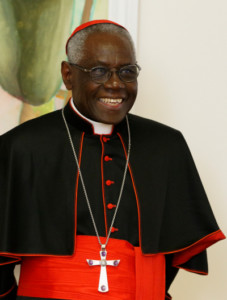
CNS photo/Paul Haring
By Robert Moynihan
Cardinal Robert Sarah and Pope Emeritus Benedict XVI spent many weeks during 2019 corresponding by letter and preparing essays about the meaning of clerical celibacy in what was ostensibly a joint project — a co-authored book.
Note: If you would like to become a sponsor of these letters, which would be very helpful in these interesting times, please click here. A monthly donation, even if very small, is very much appreciated. – RM
The book was published this week, in French, and it will soon be published in other languages, with the book’s authorship attributed to both men. (Link for a report on the Ignatius Press English-language edition.)
Suddenly, through a process that has not been fully explained, Archbishop Georg Gaenswein (below, left – pictured with Pope Francis), the personal secretary of Benedict, announced that there had been “a misunderstanding” and that the book was not co-authored by Benedict, but authored only by Cardinal Sarah “with” Pope Benedict making a contribution.
Italian journalist Antonio Socci now claims — without giving attribution to any source, so it is not known whether the account is true — that the change was ordered by Pope Francis himself (link to Socci’s article in Italian.)
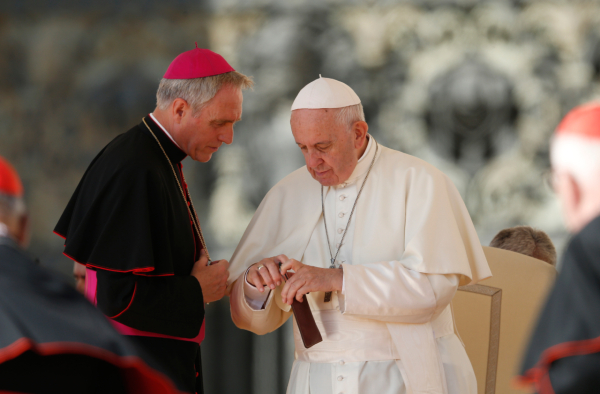
CNS photo/Paul Haring
According to this account, Francis learned of the book publication, became enraged(!), summoned Gaenswein, and in person commanded Gaenswein to do whatever was necessary to take the Emeritus Pope’s name off the book as co-author. (Indeed, Socci’s sources told him that Francis at first asked for a “total retraction,” in other words, that Benedict say he had not written any part of the book; but no “total retraction” could be made because Benedict had authored some parts of the book.)
Gaenswein then made a public announcement that Cardinal Sarah had “misunderstood” the agreement between Pope Emeritus Benedict and himself, and that, for this reason, Benedict’s name would be taken off as “co-author.” (See these links for reports on this: in German, in the Catholic News Agency report in the Catholic Herald by Hannah Brockhaus, and in the National Catholic Reporter report by Joshua McElwee.)
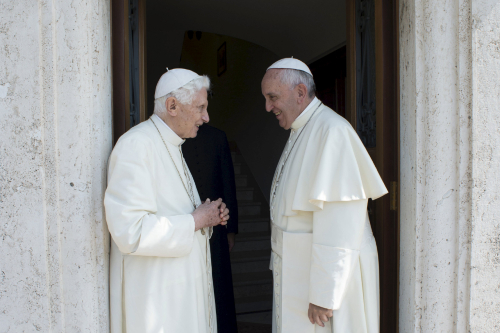
CNS photo/L’Osservatore Romano via Reuters
Here is an account, based on Socci’s report, from LifeSiteNews yesterday which tells this astonishing, but not yet fully confirmed, story:
Vatican insider: ‘Furious’ Francis demanded Benedict retract name from priestly celibacy book
Vaticanist Antonio Socci said that Pope Francis ordered Benedict’s secretary to remove the name of Benedict XVI from the cover of the book.
Wed Jan 15, 2020 – 2:39 pm EST
By Dorothy Cummings McLean
ROME, January 15, 2020 (LifeSiteNews) – A Vatican-based journalist has alleged that Pope Francis was “furious” over Pope Benedict’s contribution to a book co-authored with Cardinal Robert Sarah defending priestly celibacy, demanding that Benedict retract his name from the work.
Antonio Socci, an Italian Catholic journalist best known for his coverage of Church news, has reported on social media that Pope Francis was infuriated by the texts in Des Profondeurs de nos coeurs (“From the Depths of Our Hearts”) supporting priestly celibacy.
“The day before yesterday… the end of the world broke out in the Vatican because Bergoglio was furious,” Socci wrote on Tuesday.
“In fact, that very authoritative pronouncement of Benedict XVI prevents him from taking a pickaxe to ecclesiastical celibacy as he had planned to do in the next post-synodal exhortation,” he continued.
“Thus, [Pope Francis] personally called Archbishop (Georg) Gänswein, the secretary of Benedict XVI as well as the Prefect of Bergoglio’s Pontifical Household, and ― furious ― ordered him to remove the name of Benedict XVI from the cover of the book …”
Socci said that “reliable sources within the Vatican” had given him the “behind the scenes” story leading up to the Pope Emeritus’ decision to distance himself from the book he co-authored with Cardinal Sarah. The prolific author of such works as The Secret of Benedict XVI: Is He Still the Pope? stated that Pope Francis wanted his predecessor to renounce his authorship entirely ― which would have been a falsehood.
“Bergoglio demanded a full and total retraction,” Socci wrote.
“For this reason the first filtered news spoke of sources ‘close to Benedict XVI’ who said that Benedict had neither co-authored a book with Sarah nor approved the cover, that is, his signature on the book,” he continued.
“This, however, was not true, and Benedict XVI could not bring himself to bear false witness implying that Cardinal Sarah had involved him without his consent. Nor had Pope Benedict the least intention of retracting what he had written in defense of celibacy in that volume.”
Socci noted that at the outbreak of the scandal Cardinal Sarah had published his correspondence with the Pope Emeritus that demonstrated that the book was the work of them both and that the book had Benedict’s consent. The Pope Emeritus’ instructions to publishers to downplay his authorship in future editions of the work, however, was allegedly to protect Archbishop Gänswein.
“….Benedict also found it necessary to shelter his secretary from South American ‘vendettas,’ given that he had received a peremptory order from Bergoglio,” Socci wrote.
“Thus this compromise solution was adopted: on the cover of future editions of the book the author will be Cardinal Sarah ‘with the contribution of Benedict XVI,” he continued.
“The text in the book, in any case, will remain the same.”
Socci said that this “messy compromise” means that Pope Francis’s “court” are able to tell the media that the Pope Emeritus has retracted his signature from the book, “even though this is not true” and his name still appears on the agreed-upon parts of the work.
“A most ugly story of clerical power that in the end points to a gagging of Benedict XVI,” Socci remarked.
“However, there remains the underlying question: if Bergoglio, in his exhortation bashes celibacy, with the ordination of ‘viri probati,’ which is in fact in direct conflict with the doctrine of the Church recently reaffirmed by Pope Benedict XVI,” Socci stated.
“Thus he assumes responsibility for a most serious breach with heavy consequences.”
The American publisher of the English translation of the work, Ignatius Press, has affirmed the co-authorship of the work. The company’s founder and editor-in-chief, a former student of Joseph Ratzinger, told LifeSiteNews on Monday that claims Benedict had not co-authored the book were “fake news.”
“I just got a call from Cardinal Sarah. He confirms that Pope Benedict is co-author with him,” said Fr. Joseph Fessio.
Ignatius press confirmed Tuesday that it will continue to list the two prelates as co-authors.
According to an official letter written to the bishops of the world, but leaked to LifeSiteNews, Pope Francis wants to publish a final document on the Amazon Synod by early February. One of the most controversial topics of the synod, the possibility of ordaining married aboriginal men in the Amazon to the priesthood, is expected to be addressed in this post-synodal exhortation.
[End LifeSiteNews article on Socci’s Italian report]
So here we are…
So here we are: the controversy over this new book on priestly celibacy has exploded and is raging…
Critical issues are at stake in the battle over the publication of this book. They range from the question of:
(1) the role of celibacy in the priesthood to
(2) the nature of the relationship between Pope Francis and Pope Emeritus Benedict
Under the first point, it is generally agreed that celibacy is a “discipline” not a “dogma.” There are married Catholic priests. For example, there are about 120 married Anglican priests who, upon becoming Catholics, have been recognized as Catholic priests (link); and, in the eastern rites, priests are permitted to marry before they are ordained. However, it is the view of many — and, in particular, of Pope Emeritus Benedict and Cardinal Sarah — that the tradition of a celibate priesthood is of central importance for the identity of the priest, who is devoted exclusively (“married”) — like Christ Himself — to the Church.
Regarding the second point, this controversy raises the question of whether a retired Pope could or might have any magisterial or governing authority, and if so, of what type. So, this controversy seems to reflect an unresolved institutional crisis related to the lack of clarity about the present situation of “two Popes” — though most commentators might say that that itself is a false way of putting the matter, since, they would insist, there are not “two” Popes at all, only one — as has always been Catholic tradition and belief.
The key point today is that clarity about these issues remains frustratingly elusive because the two central characters — Emeritus Pope Benedict and Pope Francis — have not themselves spoken on the matter.
Everything that is being said about this controversy is coming from intermediaries: from the book’s co-author, Cardinal Sarah; from Archbishop Gaenswein; from publishers, like Fr. Fessio; and from anonymous “sources” of various reliability…
Only if Benedict and Francis would speak, without intermediaries, could some semblance of clarity emerge.
In re-publishing the reports that follow, I attempt to make a contribution to clarifying the issues at stake, without pretending to offer a definitive conclusion about the truth of what has transpired.
Two key points
There are two key points to keep in mind:
(1) A puzzling delay in an expected decision on celibacy in the priesthood from Pope Francis.
Pope Francis had been expected to issue his “wrap-up” statement on the Amazon Synod, held during October in Rome, either just before or after Christmas, 2019.
Speculation was that his statement would approved the ordination of married men in the Church in the special context of the Amazon region.
But it was widely understood that, if the approval was granted for the Amazon Region, it would “inevitably” (so observers on all sides judged) slowly be extended to places like Germany, and then to other countries, and finally to the whole world.
But that statement has not yet come out.
But now two weeks have passed by since the end of 2019.
Something seems to be holding up the post-Synod statement.
And at this precise moment, this book has appeared, containing a direct appeal from the old Pope (Benedict) to the new Pope (Francis) not to take the step many expect Pope Francis is about to take.
So this is the drama of the situation. Benedict in the book is appealing to Francis not to take a step many were expecting Francis has decided to take.
(2) A public “slap” against both Emeritus Pope Benedict and Cardinal Sarah
The events of the past three days are being read by most Vatican observers as a public “slap” against both Cardinal Sarah and Emeritus Pope Benedict by “someone” who evidently has authority over both of them.
That “someone” is evidently Francis himself.
But this is still not entirely clear, because — as some observers say — it could be that someone in the circle of Francis has acted on Francis’ behalf.
In this view, Francis may not be fully aware of what is being done under his authority.
It would not be the first time, in the Vatican, that decisions are taken and commands issued without informing the Pope.
Two additional articles
Here follow two articles of considerable interest:
(1) a comment today by Archbishop Carlo Maria Viganò on the role of Archbishop Gaenswein, and
(2) a more general reflection on these matters in First Things written by Francis X. Maier, the Chancellor of Archbishop Charles Chaput in the archdiocese of Philadelphia — and at one time, when I worked at the National Catholic Register in the 1980s, my editor and mentor.
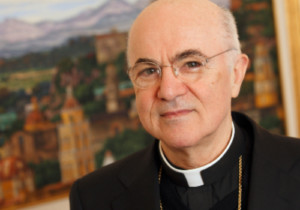
CNS/Paul Haring
Article #1: Today’s Comment by Archbishop Viganò
Abp Viganò denounces Benedict’s secretary for ‘abusive and systematic control’ of Pope Emeritus
‘Gänswein,’ Viganò claims, ‘habitually filtered information, arrogating to himself the right to judge how opportune or not it was to send it to the Holy Father.’
LifeSiteNews Thu Jan 16, 2020 – 1:00 am EST
By Diane Montagna
ROME, January 16, 2020 (LifeSiteNews) — In the wake of the controversy surrounding the genesis of Cardinal Robert Sarah’s new book with Benedict XVI on priestly celibacy, Archbishop Carlo Maria Viganò has released a testimony denouncing Archbishop Georg Gänswein for what he calls his “abusive and systematic control” of the Pope Emeritus.
“It is time to reveal the abusive and systematic control exercised by Archbishop Georg Gänswein over the Supreme Pontiff Benedict XVI since the beginning of his pontificate,” Archbishop Viganò writes in the one-page testimony released on January 16 (see official English text below).
LifeSite has reached out to Archbishop Gänswein, and will update readers if he responds.
Archbishop Viganò’s testimony follows several days of fierce backlash against the pope emeritus and the cardinal, portraying them as opposed to Pope Francis and undermining his widely anticipated apostolic exhortation on the Amazon Synod. It also comes after the Archbishop Gänswein openly contradicted Cardinal Sarah’s official account of the genesis of the book, claiming instead that Benedict “did not approve a project for a co-authored book and he had not seen or authorized the cover.”
In the new testimony, Archbishop Viganò asserts that “Gänswein habitually filtered information, arrogating to himself the right to judge how opportune or not it was to send it to the Holy Father.”
Archbishop Gänswein, who currently serves as personal secretary to Benedict XVI and as prefect of the papal household in the current pontificate, has worked alongside the pope emeritus for over two decades. In 1996, Gänswein joined the staff of Cardinal Joseph Ratzinger in the Congregation for the Doctrine of the Faith, and in 2003, he replaced Josef Clemens as Ratzinger’s secretary.
When Cardinal Ratzinger was elected pope in 2005, Gänswein was appointed his principal private secretary. In 2012, he replaced Cardinal James Michael Harvey as prefect of the papal household. In this post, the German prelate oversaw the majority of Pope Benedict XVI’s public and private events, correspondence, visitors, and apostolic journeys.
In his January 16 statement, Archbishop Viganò offers two personal experiences he had of Gänswein’s alleged “control” of Benedict, the first as a high-level official in the Vatican Secretariat of State and the second as apostolic nuncio to the United States.
He says what has moved him to take this step is Archbishop Gänswein’s “sensational and slanderous insinuation” against Cardinal Robert Sarah following the release of the new co-authored book, titled From the Depths of Our Hearts: Priesthood, Celibacy, and the Crisis of the Catholic Church.
In comments to the ANSA news agency on Tuesday, Archbishop Gänswein said he has “acted on instructions from the pope emeritus and asked Cardinal Robert Sarah to contact the book’s publisher and request that they remove Benedict XVI’s name as co-author of the book, and remove his signature from the introduction and conclusion.”
“The Pope Emeritus knew that the cardinal was preparing a book and he sent him a text on the priesthood authorizing him to use it as he wished,” Gänswein continued. But contrary to an official statement released by Cardinal Sarah earlier on Tuesday, the German prelate claimed that Benedict “did not approve a project for a co-authored book, and he had not seen or authorized the cover.”
“It is a misunderstanding that does not raise questions about Cardinal Sarah’s good faith,” he said.
Just a short time after, Cardinal Sarah openly said he stood by his official statement, affirming that it “remains my one and only version of the course of events.”
Ignatius Press, which is publishing the book in English, has stood by the co-authorship and cover.
Here below is the official English text of Archbishop Carlo Maria Viganò’s testimony.
* * *
Testimony by Archbishop Carlo Maria Viganò
January 16, 2020
By Archbishop Carlo Maria Viganò
It is time to reveal the abusive and systematic control exercised by Archbishop Georg Gänswein over the Supreme Pontiff Benedict XVI since the beginning of his Pontificate.
Gänswein habitually filtered information, arrogating to himself the right to judge how opportune or not it was to send it to the Holy Father.
I can testify that, when Pope Benedict summoned me in audience on April 4, 2011, a few days after I had sent him my first letter (that was later illegally published during Vatileaks), I said to the Pontiff: “I will not speak to you about the situation of corruption in the management of the Papal Villas, since I assume that you have already taken note of the memo on the matter, which I delivered to your secretary for you, in view of this audience.”
The Holy Father, in all simplicity and innocence, and without showing any surprise, said to me: “No, I didn’t see anything.”
I also testify to another event that shows how Monsignor Gänswein controlled information for the Holy Father and conditioned his freedom of action. On the occasion of the canonization of Marianne Cope and Kateri Tekakwitha, having requested in writing to the then-prefect of the papal household, Archbishop James M. Harvey, to be received in audience by the Pope, and having received no response, I went to the same Prefect on Tuesday, October 23, 2012, asking him why I had received no response to my request for an audience.
I remember perfectly the circumstance, because Archbishop Harvey suggested that I attend the general audience the next day, so that I could at least greet the Holy Father personally, with the other bishops who were present. Archbishop Harvey answered me with the following words: “Gänswein said to me: ‘Archbishop Viganò is the last person who can approach Pope Benedict!’”
He then added that, at the beginning of his pontificate, Benedict XVI, indicating Gänswein to him with his index finger, exclaimed: “Gestapo! Gestapo!”
This unscrupulous attitude was revealed from the very beginning of his pontificate, also in the determination with which Gänswein managed to distance from the pope his precious assistant and secretary, Ingrid Stampa, whom then-cardinal Ratzinger had wanted at his side for well over a decade after the death of his sister Maria Ratzinger.
Furthermore, it is known that to escape this total control exercised over his person by Gänswein, Pope Benedict often went to visit his previous special secretary, Bishop Josef Clemens, inviting Ingrid Stampa to these familial gatherings.
I am issuing this statement following what Archbishop Gänswein asserted in recent days to the ANSA news agency, contradicting what Pope Benedict himself had written in his correspondence with Cardinal Sarah. This statement is a sensational and slanderous insinuation against the most eminent Cardinal Robert Sarah, which he swiftly denied.
Translation by Diane Montagna of LifeSiteNews.
Article #2: The First Things Comment of Francis X. Maier
Author’s note: On January 14, in the latest curiosity from Rome, Pope Emeritus Benedict XVI asked through a spokesman that his name be removed from a pending book on priestly celibacy, in which he and Cardinal Robert Sarah were listed as coauthors. While acknowledging that the Pope Emeritus had collaborated with Sarah, the spokesman stated Benedict had never agreed to be named coauthor. Cardinal Sarah, for his part, stressed that Benedict had been fully aware of the book project, and following “several exchanges in order to develop the book,” he had sent a “complete manuscript” to the pope emeritus in November: “as we had jointly decided, the cover, a common introduction and conclusion, the text of Benedict XVI and my own text.” In an alternate, more tranquil (and healthier) reality, one with less frenzied media and less toxic ecclesial politics, the book with its shared concerns might proceed to public consumption. If it did, a review, based on the actual, advance-copy text, would go like this:
SEX, CELIBACY, AND THE LATEST CURIOSITY FROM ROME
1 . 15 . 20
In the wake of the recent Amazon Synod, Catholics are living through another conflict on the matter of priestly celibacy. Happily, From the Depths of Our Hearts, by Benedict XVI and Cardinal Robert Sarah, serves our obligation to honesty and clarity exceptionally well in any discussions of a married priesthood.
Mandatory priestly celibacy has been a source of controversy since Vatican II.
Among the arguments advanced against it are today’s obvious need for more priests, as well as the centuries-long tradition of a married priesthood in Eastern Orthodox and various Eastern Catholic communities.
If priestly celibacy is merely a discipline of the Western Church, then disciplines can be changed.
Moreover, a married presbyterate—so the reasoning goes—would have practical advantages: Mission cultures often see celibacy as an alien and negative value; more men would be willing to consider the priesthood if they could marry; and incidents of clerical sex abuse might thereby be reduced.
The Amazon Synod seemed to offer hope that a married priesthood, initially limited in scope and restricted to narrowly defined circumstances, might finally be possible for the Latin Church.
Ordaining viri probati, or men of proven virtue, to serve as priests in mission territories would set the necessary precedent for a gradual reexamination of celibacy’s theology and utility.
In From the Depths of Our Hearts, Benedict and Sarah dismember such reasoning in a brief but brilliant defense of priestly celibacy.
And they achieve it in a genuine spirit of fidelity both to Pope Francis and to the historic corpus of the faith.
The two men differ stylistically in their approach to the subject matter, but the book mirrors their extended, private exchange of concerns out of which the text emerged.
Benedict deals with the history and theology of priestly celibacy.
Sarah focuses on the pastoral significance of a celibate priesthood, and the destructive implications of undermining it.
Benedict is among the premier Christian theologians and intellectuals of the last 100 years.
A master of biblical exegesis and historical evidence, he makes his case for celibacy with clear, articulate, and persuasive logic.
Sarah, a native son and former pastor of African mission territory, argues with elegant passion from direct experience.
The result of their collaboration is complementary and compelling.
Benedict notes: “In the common awareness of Israel, priests were strictly obliged to observe sexual abstinence during the times when they led worship and were therefore in contact with the divine mystery. . . . Given that the priests of the Old Testament had to dedicate themselves to worship only during set times, marriage and the priesthood were compatible.
“But because of the regular and often daily celebration of the Eucharist, the situation of the priests of the Church of Jesus Christ has changed radically. From now on their entire life is in contact with the divine mystery. This requires on their part exclusivity with regard to God. Consequently this excludes other ties which, like marriage, involve one’s whole life.”
Benedict in no way diminishes the dignity of marriage; quite the opposite. Both marriage and the priesthood require a radical and exclusive gift of self. Thus, while each is essential to Christian life and each complements the other, they cannot be integrated without jeopardizing both. As Sarah explains, “the priest’s capacity for spousal love is entirely given to and reserved for the Church. The logic of the priesthood excludes any ‘other spouse’ than the Church.”
Sarah’s contribution is especially powerful and zealous. “The priesthood,” he writes, “to repeat the words of the Curé of Ars, is the love of the heart of Jesus. We must not make it a subject of polemics, of ideological battle or of political maneuvering. Nor can we reduce it to a question of discipline or of pastoral organization.”
He is uncompromisingly frank in arguing that “he who has not given himself totally to God is not given perfectly to his brethren,” and that many of the current attacks on the value of priestly celibacy “show a terrible intellectual dishonesty.” He adds, “I am convinced that if a large number of Western priests or bishops are willing to relativize the greatness and importance of celibacy, it is because they have never had the concrete experience of the gratitude of a Christian community.”
In the end, both Benedict and Sarah see priestly celibacy, and the sacrifices (but also the joy—the tangible joy) it entails, as vital to the life of the Church. Efforts to diminish or abolish it are, in effect, a surrender to a confused and hypersexualized wider culture. Matters sacramental and supernatural cannot be reduced to the pragmatic, the functional, and the utility-driven. But, as the authors forcefully show, critics of priestly celibacy—however good their intentions—inevitably do exactly that, to the detriment of the believing community they seek to serve.
Francis X. Maier writes from Philadelphia.

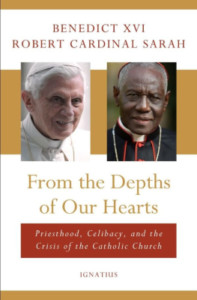








Facebook Comments